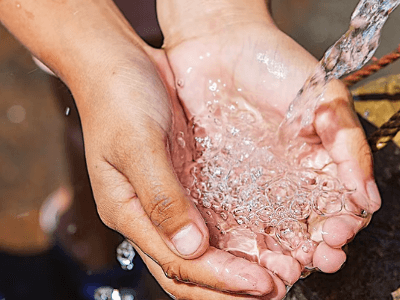Some people choose to live in a tiny house for the same reason they go camping – access to the outdoors, freedom of movement and a sense of adventure, and growing as a person by encountering the challenges that come with facing the wilderness. This experience is enhanced by moving your water source off-grid, but doing so needs to be done right.
Off Grid Tiny House Water
There are several good options for sourcing freshwater when off-grid, including bottled water, water storage tanks, and well water. Equally important is waste disposal of greywater and blackwater, which needs to be disposed of properly.
Options for Sourcing Freshwater for Off-Grid Tiny Houses
There are a few main options for sourcing off-grid water. Depending on your mobility, budget, and ability to safely filter your water source, some of these options might be preferable to others.
Bottled Water
The first is the most obvious and the least attractive for many people: bottled water. In addition to the plastic waste, constantly buying new bottles from stores quickly becomes expensive and inefficient.
Water Delivery Service
One remedy to bottled water waste is a professional water delivery service.
Delivered water is usually a reusable 5-gallon jug that needs a pedestal. A newer option is a screw on top that takes up much less space like this one.
One downside to this method is where you’re located. If you’re already off grid, the delivery vehicles likely don’t service a lot of those types of locations.
Freshwater Tanks
An easier and environmentally friendlier source for freshwater is freshwater tanks, which can be installed in your tiny house and then filled with sources from a variety of options (listed below).
Well Water
If you’re intending to stay in one place for a long time, installing a well is one of the best options for getting off-grid water. The downside is the expense of installation, as well as the limits permanent infrastructure imposes on your mobility. A hand dug shallow well is a great option.
Rain Water
Rain water collection tanks are cheaper and less permanent than a well and are a great source of drinking water when treated properly.
In most cases you will want to have other drinking water sources; relying on the rain for a constant source is not a good idea, but it is a great supplement for a bottled water delivery service, and can be the main source of your drinking water when the weather agrees that it should be so.
A collapsible 50 gallon collection barrel is a great option for storing water and can be easily stashed when not being used.
Lake Water
Lake water becomes more convenient the closer you are to the shore, and becomes really inconvenient really quickly when transporting water over longer distances.
As with rainwater, if you do choose this method, you need to be careful to treat your water properly either with filters, UV or chlorine based filtration systems, or other NSF-approved safety measures for drinking water.
Storing and Disposing of Waste Water
There are two types of waste water in off-grid living: greywater and blackwater. These need to be stored and disposed of in specific ways.
Storing and Disposing Greywater
Greywater is waste water that doesn’t contain human waste – this includes water from washing dishes, showers, and scrubbing your floors. You can use any tank for greywater that you would use to store freshwater, but you might want to choose a distinctive tank to avoid confusion.
In most cases, you can legally pour greywater out on the ground.
Storing Blackwater
Blackwater is sewage. In an off-grid tiny house many people use a composting toilet or an outhouse, but some models have an in-house bathroom, in which case you will use a blackwater tank.
Blackwater tanks are built with tougher materials to avoid leaking and can be purchased at most home goods stores. Disposing of blackwater needs to be done properly, and most states have regulations regarding the safe disposal of sewage; check with your local government to find a municipal sewer for approved black water tank disposal.
Other options for Waste Water Disposal
Depending on how deeply you want to entrench yourself in one location, installing a septic system can solve your blackwater problems. The downside is that you will limit your mobility, so be clear on how long you plan to stay in one place before investing in a septic tank.
Alternative Sewage Options
A blackwater tank can be unpleasant to clean and maintain, and many tiny house owners find composting toilets to be great alternatives. Most composting toilets require their own housing unit (a small shed), and can run into the tens of thousands of dollars. If your budget allows it, it’s worth considering (but by no means free of its own problems).
Conclusion
Moving off-grid is great for the environment and provides a peaceful, fulfilling way of life, but you need to prepare ahead of time the ways you will source freshwater and dispose of waste water, which in most cases will involve the following:
- Freshwater can be sourced from bottles, a delivery service or a well, rain water collection system, or properly-treated lake water.
- Waste water needs to be disposed of properly and the two types of waste water require different treatments.
- Greywater can be disposed on the ground, most of the time, and doesn’t require any specific type of tank.
- Blackwater needs to be disposed of in accordance with your local laws, and should be stored in a blackwater tank
Understanding the different options available to you for sourcing freshwater, and knowing the proper way of disposing of wastewater will make moving your tiny house off-grid a life-changing decision.

